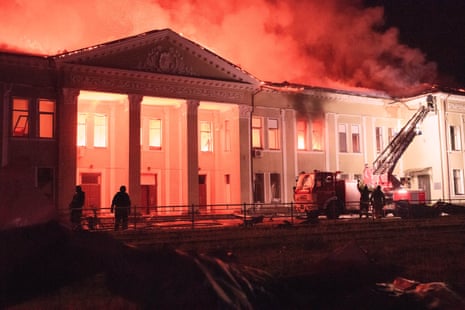No, do not bomb Moscow
Jakub Krupa
US president Donald Trump clarified overnight that, contrary to reports, he does not want Ukraine to target Moscow with long-range missiles: “No, he should not target Moscow.”

But he reminded Russian president Vladimir Putin of the 50 days deadline to reach a peace settlement over Ukraine. “I don’t think it’s a long time,” he warned.
Asked what options he was expecting to have if Russia doesn’t respond to the ultimatum, he said:
“A lot of opinions change very rapidly. Might not be 50 days, might be much sooner than 50 days.”
Trump also confirmed that first Patriot deliveries for Ukraine, via Germany, are “already being shipped.”
But Russia appears to be undeterred in its attacks, with Ukraine’s air force reporting this morning that 400 drones and one ballistic missile were launched, mostly targeting three cities of Kharkiv, Zelenskyy’s hometown of Kryvyi Rih and Vinnytsia.
At least two people were reported dead, with at least 12 injured.

Separately, we will be looking at the fallout from the French budget presentation last night, and ahead to the European Commission’s announcement of its plans for the EU’s budget 2028-2034 later today.
I will bring you all the latest here.
It’s Wednesday, 16 July 2025, it’s Jakub Krupa here, and this is Europe Live.
Good morning.
Key events
Please turn on JavaScript to use this feature
Ukraine wing of US-founded terrorist group says it was involved in killing of intelligence officer in Kyiv

Ben Makuch
The Ukrainian wing of an internationally proscribed far-right terrorist organization with suspected links to Russia is claiming involvement in the brazen assassination of an intelligence officer in Kyiv.
Late last week, a masked assailant shot and killed Col Ivan Voronych of the Ukraine security service (SBU) as he walked through a Kyiv parking lot in broad daylight. Shocking footage of the assassination circulated in Ukrainian media and caused a stir among residents in the capital.x
For months, the Base, born in the US and with a web of cells all over the world, has been offering money to supporters or willing participants for targeted assassinations and attacks on the critical infrastructure of Ukraine, coinciding with allegations that its American founder, Rinaldo Nazzaro, was a Kremlin spy.
Ukrainian authorities have also been warning in recent weeks of similar Russian intelligence operations covertly paying unknowing citizens to carry out sabotage inside their country.
“The shooting of the SBU colonel is not the end, but only the beginning,” said a statement posted on a Telegram channel that appears to be linked to the the Base’s supposed Ukrainian cell. “We will continue our struggle until justice prevails.”
The same post, translated from Ukrainian, added that the group’s members were “proud of our associates” who carried out the killing and said they didn’t care if naysayers thought of them as “terrorists and extremists”. In another message to subscribers, the account also threatens other Ukrainian public figures and promises: “The hunt continues!”
Sources in the counter-terrorism field reviewed the posts and said they appeared credible and represented an escalation from the Base, which is now either endorsing treasonous murders inside of Ukraine, actively commissioning them, or both.
EU-US talks turn political as Šefčovič flies to Washington – snap analysis

Lisa O’Carroll
Here’s our snap analysis on the news that European trade commissioner Maroš Šefčovič will fly to Washington this afternoon for separate in-person meetings with commerce secretary Howard Lutnick and US trade representative Jamieson Greer.
The meetings come after Trump blew up an agreement in principle both parties had come to last week.
After starting last week praising the EU for turning from “nasty” to “nice” expectations were high that he would sign off on the three page framework deal.
But on Saturday he announced the 10% tariffs he has currently imposed on EU imports would jump to 30% after 1 August if it didn’t concede more.
The EU had worked on the assumption, that just as UK prime minister Keir Starmer had done, it would be able to concede a Trump-term 10% tariff rate (up from an average of 2.5%) in exchange for relief from punitive tariffs on cars and steel.
Overnight Trump has once again threatened to impose tariffs on pharma imports, warning he would likely introduce a low tariff at the end of the month to encourage US multinationals operating abroad including Ireland to repatriate manufacturing.
Ireland’s finance minister last night reportedly received a “grim” briefing on the future of the economy, factoring in a reduction in foreign investment in future.
Lutnick’s role is to help the president shape tariffs on sectors Trump is threatening to target including pharma, semiconductors and lumber.
Polish-owned company in Ukraine confirms Russian attack left two injured

Jakub Krupa
We also just got an update on the Russian attack on a Polish-owned factory in central Ukraine, first reported by the Polish foreign minister Radosław Sikorski earlier today (10:40).
The factory’s owner, the layered wood floor producer Barlinek Group, told the Guardian in a statement that two people were injured in the attack.
They added:
“At the moment, we do not anticipate that production will resume any earlier than in 6 months. The losses are significant and are still being assessed.
For safety reasons, we have decided not to provide more detailed information.”
The Polish ministry of foreign affairs told Gazeta Wyborcza newspaper that eight people were injured, including two seriously.
EU’s Šefčovič travels to Washington for US trade talks on tariffs
Separately, the European Commission has just confirmed that EU trade commissioner Maroš Šefčovič will travel to Washington DC today for talks with US commerce secretary Howard Lutnick and US trade representative Jamieson Greer.
The meetings come as part of the EU’s push to get an agreement with the US on tariffs before 1 August.
French opposition parties threaten to topple PM Bayrou over budget plans – analysis

Jon Henley
in Paris
France’s opposition parties have reacted furiously to the austerity budget outlined by prime minister François Bayrou, threatening to topple his minority government at the first opportunity this autumn unless he revises his proposals.
“The only possible prospect is a vote of no confidence,” said the Socialist party (PS) leader, Olivier Faure, denouncing “a series of violent measures” that amounted “not to a recovery plan but to the outright destruction of France’s social model”.
Marine Le Pen of the far-right National Rally (RN), the largest single party in parliament, said the government “prefers to turn on the French people rather than tackle waste.”
If François Bayrou does not correct his work, we will vote him down.
Éric Coquerel of the radical left LFI described the proposals as “a social and economic catastrophe”, while his party colleague Manuel Bompard said the author of such an act of “unprecedented brutality against the people” would “of course be censured”.
The general secretary of the CGT trades union deferation, Sophie Binet, called on Wednesday for a “mass mobilisation by all unions” from September against a budget that was “not only deeply unfair to workers but dangerous for the country”.
Even Laurent Wauquiez of the centre-right Les Républicains (LR), who mostly back the government, criticised budget “shortcomings” – including insufficent spending cuts – which he said the party would address in talks with Bayrou over the summer.
President Emmanuel Macron’s decision to call a snap election last year delivered a hung parliament in which Bayrou does not have the votes to pass his budget, expected to be presented to parliament in October, without opposition support.
Bayrou has three short months in which to try to win his opponents over.
But as things stand, it looks likely that he will face a no-confidence motion just like the one that last December toppled his predecessor, Michel Barnier.
If the RN in particular votes against him, as it has promised to do, he will suffer the same fate.
French PM may scrap two public holidays to reduce country’s crippling debt

Jon Henley
in Paris
France’s prime minister, François Bayrou, has proposed scrapping two public holidays as part of radical measures aimed at reducing the country’s ballooning deficit, boosting its economy and preventing it being “crushed” by debt.
Outlining the 2026 budget on Tuesday, Bayrou suggested Easter Monday and 8 May, when France commemorates Victory Day, marking the end of the second world war, although he said he was open to other options.
The centrist prime minister said: “The entire nation has to work more so that the activity of the country as a whole increases, and so that France’s situation improves. Everyone will have to contribute to the effort.”
France is under pressure to bring its public deficit, running at 5.8% of GDP, under the 3% figure required by EU rules, and to rein in €3.3tn of public debt – on which the annual interest, of €60bn, could soon become its biggest budget outlay.
The debt mountain represented a “mortal danger” for a country “on a cliff edge” and “still addicted to public spending”, Bayrou said, outlining steps he said would cut €43.8bn from the budget, reducing the deficit to 4.6% next year and 3% by 2029.
Other measures would include an across-the-board freeze on government spending except for debt servicing and the defence sector, which president Emmanuel Macron demanded should be increased by €3.5bn next year and more in 2027.
The move to scrap public holidays is likely to meet strong resistance, although France has previously discussed combining VE Day with Armistice Day on 11 November, creating a single memorial day for the victims of the first and second world wars.
Without an agreement, the veteran prime minister is likely to face a no-confidence motion similar to the one that toppled his predecessor, Michel Barnier, as early as October, when his detailed budget bill is due to go before to parliament.

Jakub Krupa
I promised we would take a look at the situation in France after last night’s budget announcement by the country’s prime minister François Bayrou.
So, let’s first catch up with what he said, and then – with reactions to his plans.
Over to Jon Henley in Paris.
Man arrested in Ukraine over bomb threats against Czech, Slovak schools
A joint Czech, Slovak and Ukrainian police operation arrested a Ukrainian man who was allegedly sending bomb threats against “hundreds” of Czech and Slovak schools, the forces confirmed.

The arrest took place in the Dnipro region of Ukraine as a result of the forces’ joint investigation into multiple emailed bomb threats that started in September last year.
Czech media outlet iDnes.cz reported that the threats were emailed to hundreds of schools, and were investigated by the Slovak police at the time as potential terrorism incident.
The Slovak police said in a statement that the forces also conducted a number of house searches, seizing computers and mobile telecommunications equipment.
Patriot-owning countries to meet to coordinate aid for Ukraine next week – reports
Separately, Reuters reported that a meeting of Patriot owner nations and Ukraine donors, aiming to find additional Patriot air defence batteries for Kyiv and chaired by Nato’s top military commander could take place Wednesday next week.
Polish factory in Ukraine targeted by Russian attacks overnight, Polish minister says
Polish foreign minister Radosław Sikorski has just said that overnight Russian drone attacks on Ukraine “deliberately” targeted a Polish company’s factory in Vinnytsia with strikes “from three sides.”
The company is owned by the Barlinek Group, a major manufacturer of layered wood floors, Sikorski said. Vinnytsia is about 400-500 km away from the Polish border.
He said there was a number of injured, including two with serious burns.
“The Ukrainian services are active, as is our consulate,” he said.
He added:
Putin’s criminal war is approaching our borders.
The attack comes hours before Sikorski is scheduled to meet with Ukrainian and Lithuanian foreign ministers in Lublin, Poland.
EU court dismisses appeal on Jean-Marie Le Pen’s expenses
An EU court dismissed an appeal brought by Jean-Marie Le Pen’s heirs against a European parliament decision demanding repayment for about €300,000 the late French far-right leader unduly claimed in expenses, AFP reported.
The court’s press release said “according to the parliament, Mr Le Pen had improperly invoiced personal expenses under budget item 400, intended for MEPs’ parliamentary expenses.”
The court rejected the arguments made by Le Pen’s three daughters – Marine, Marie-Caroline, and Yann – saying the parliament’s procedure was “not contrary to the principles of legal certainty and the protection of legitimate expectations.”
It added that Le Pen’s right to a fair trial was also respected.
Le Pen, who died in January this year, was a member of the European parliament between 1984 and 2019.
Here’s our Ukraine war briefing in full if you want to catch up on the latest.
No, do not bomb Moscow

Jakub Krupa
US president Donald Trump clarified overnight that, contrary to reports, he does not want Ukraine to target Moscow with long-range missiles: “No, he should not target Moscow.”
But he reminded Russian president Vladimir Putin of the 50 days deadline to reach a peace settlement over Ukraine. “I don’t think it’s a long time,” he warned.
Asked what options he was expecting to have if Russia doesn’t respond to the ultimatum, he said:
“A lot of opinions change very rapidly. Might not be 50 days, might be much sooner than 50 days.”
Trump also confirmed that first Patriot deliveries for Ukraine, via Germany, are “already being shipped.”
But Russia appears to be undeterred in its attacks, with Ukraine’s air force reporting this morning that 400 drones and one ballistic missile were launched, mostly targeting three cities of Kharkiv, Zelenskyy’s hometown of Kryvyi Rih and Vinnytsia.
At least two people were reported dead, with at least 12 injured.
Separately, we will be looking at the fallout from the French budget presentation last night, and ahead to the European Commission’s announcement of its plans for the EU’s budget 2028-2034 later today.
I will bring you all the latest here.
It’s Wednesday, 16 July 2025, it’s Jakub Krupa here, and this is Europe Live.
Good morning.















